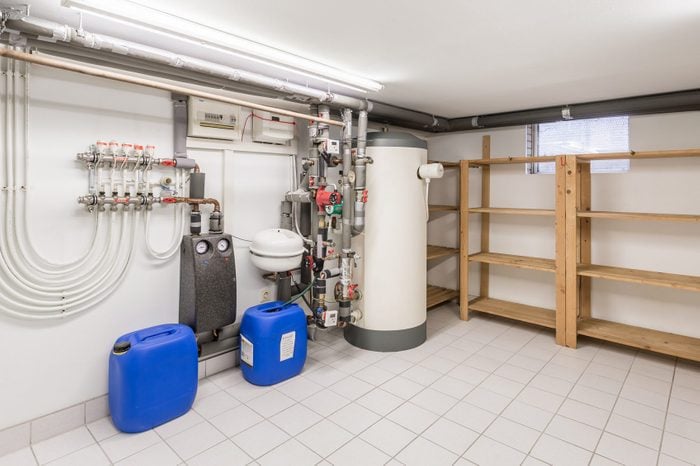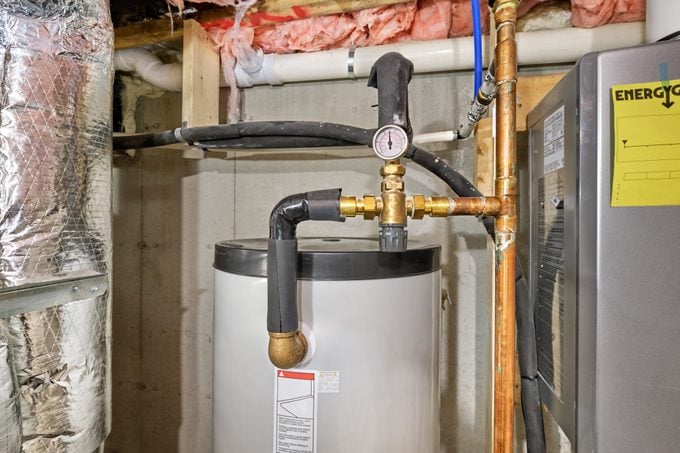The Sneaky Fire Hazard in Your Basement You May Not Know About
Updated: Oct. 31, 2023

A firefighter explains how to avoid a water heater fire and the safety tips you need to know
Most fire hazards in your home are obvious—dryer lint, extension cords or candles near curtains. Others can be invisible, such as faulty electrical wiring behind your walls. But there are some fire hazards that are just plain unknown and may never have crossed your mind, including water heater fires.
But just how dangerous are water heaters—and where do they stand compared with fires from space heaters, for instance? Here are the things firefighters wish you knew about the hidden hazards of home water heaters, including which items you should never store near them.
Get Reader’s Digest’s Read Up newsletter for home, humor, cleaning, travel, tech and fun facts all week long.
How can water heaters cause a fire?
According to Zack Zarrilli, who spent 15 years as a firefighter and paramedic before starting SureFire CPR, water heater fires can be the result of a few things. They can be caused by improper storage of items around the water heater, gas leaks or failures within the water heater itself. Knowing how these potentially devastating fires spark can help keep your home free of water heater fires.
Improper storage
Gas water heaters have open flames in the form of pilot lights and burners, which ignite with a “whoosh” when you turn the thermostat. Just like an exposed light bulb, water heaters can ignite items stored around them. Older water heaters in particular are vulnerable, since they have a removable door to the combustion chamber.
If that door gets left off, or if your water heater malfunctions, you could experience flame roll-out, when fire from the burner is not contained within the chamber. If you ever see scorch marks on the front of your gas water heater, call a plumber immediately.
Gas leaks
Another hidden home danger? Gas leaks. They can cause devastating home explosions. If the gas lines to your water heater get damaged, were poorly installed or develop a leak due to age, gas can escape into your home. And because the water heater is often in a closet, or tucked in a corner of the basement, you may not know you have a gas leak until it’s too late.
The National Fire Protection Association (NFPA) found that between 2012 and 2016, of fires caused by the ignition of natural gas, the majority of deaths were due to heating equipment, including water heaters. Cooking fires were the other culprit, causing fewer deaths but responsible for most of the ignitions.
Internal failures
Your water heater looks kind of like a missile, doesn’t it? That’s exactly what it can become too, if something called the temperature pressure relief (TPR) valve fails. When water is heated, it expands. Your water heater has a TPR valve to relieve the pressure that builds up. (You may also have an expansion tank to hold the extra heated, pressurized water.)
“The system’s temperature and pressure relief valve allows excess pressure to escape the tank,” Zarrilli says. “[If] pressures continue to accumulate until the tank can no longer hold,” it can cause an explosion and possibly a fire.
How many fires do water heaters cause annually?

Water heaters were responsible for an average of 3,160 fires annually from 2016 to 2020, according to the NFPA. That’s 7% of all home heating fires, which are classified as fires caused by heating equipment, such as furnaces, boilers and water heaters. Fires from water heaters cause an average of $83 million dollars in property damage every year. They also kill 20 people annually on average.
Most home heating fires are caused by space heaters, which are also responsible for the vast majority (88%) of deaths.
Are the risks the same with electric, propane and oil water heaters?
All water heaters carry some risk, but “the risks with gas, propane and oil can be higher than with electricity, due to flammability and explosion risks,” Zarrilli says. Gas water heaters have burners and pilot lights, and even though they’re usually safely contained within the heater, they’re still open flames. If something goes wrong—a leak in your gas line, a dust bunny that finds its way into the burner compartment, or an internal failure—it could spark a fire.
“Electric water heaters do not require a gas line, burner or pilot light,” Zarrilli says. The heating elements are contained within the water inside the tank. Where your electrical fire risk comes from is faulty wiring or poor connections at the incoming power feed, thermostat or high-limit switch. Luckily, these connection points are well-insulated and sandwiched between the metal tank and the outer shell, but it’s important to keep the covers on to contain any arcing from poor connections.
What items should you never store near a water heater?
It’s not fun cleaning hidden rooms that no one sees, but water heater closets and storage areas can become a fire hazard if you don’t clean enough. Zarrilli says it’s important to keep the space around the water heater free of clutter. “There should be at least a 30-inch radius around the water heater that is open and clear space,” according to Zarrilli, and this includes walls. In fact, 30 inches is the minimum, he says. “It is recommended to keep at least 3 feet of clear space to ensure further safety.”
Here is a list of items you should never store near, or on top of, a water heater.
- Moving boxes, stacks of newspapers or magazines, photo albums or any paper combustibles
- Flammable liquids and gases, including paint thinners, spray paint cans and propane tanks
- Bug bombs. “Bug foggers should not be used [or stored] in close proximity to water heaters,” Zarrilli says.
- Brooms, mops and household cleaners
- Rope, twine, rugs and textiles, such as clothing and coats
How else can you make sure your water heater closet is safe?
The most important thing to do to prevent water heater fires is to install the water heater correctly and in compliance with all local building codes. A licensed plumber will know the specifics for your particular heater type and location. No matter if it’s gas or electric, or where your water heater is located—in a water heater closet, garage or basement—the following safety rules apply.
Keep the area clean
As Zarrilli stressed above, clutter around your water heater is just asking for trouble. If your water heater is enclosed in a closet, keep the door closed so it’s less easy to stash junk inside. Periodically sweep or vacuum to remove dust bunnies and pet hair, and declutter frequently to make sure the area keeps that minimum 30-inch boundary around the water heater.
Don’t block pipes, exhaust or valves
Every part on your water heater has a function, so it’s important not to make its job more difficult. Leaving a shop rag on top of a gas water heater could block the flue and create a buildup of gases. Blocking the TPR valve could prevent it from operating in an emergency. Discharge pipes must be clear and unhindered to a drain, so dirty standing water can’t back up into your home’s potable water. All of these precautions will help eliminate the chance of a water heater fire.
Maintain it properly
Check the installation guide to see how frequently your water heater needs maintenance, such as sediment draining and TPR valve testing. If you are a confident DIY-er, many of these maintenance items—like flushing out your water heater—can be done yourself. Yearly service by a trained technician may also be recommended.
About the expert
- Zack Zarrilli spent 15 years as a firefighter and paramedic before founding SureFire CPR. In his work as a first responder, Zarrilli saw that bystanders often felt powerless to help, even if they knew CPR. SureFire CPR’s training empowers people to confidently administer CPR to people who need it.
Sources:
- National Fire Protection Association: “Home Heating Fires”
- National Fire Protection Association: “Natural Gas and Propane Fires, Explosions and Leaks: Estimates and Incident Descriptions”
- International Association of Certified Home Inspectors: “TPR Valves and Discharge Piping”
- National Fire Protection Association: “Home Heating Fires (Report)”
- National Fire Protection Association: “Home Heating Fires (Supporting Tables)”



